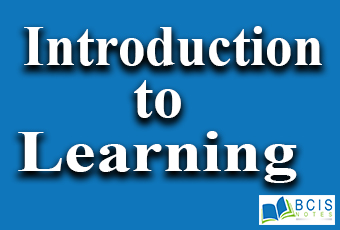
Introduction to Learning:
Learning is a continuous process and encompasses much more than what we do in school. It is a key process in human behavior. It is much more than learning the skills or academic subject materials. In psychology, learning refers to any relatively permanent change in behavior through experiences because of interactions with the environment. Learning is the process of acquiring new or modifying existing, knowledge, behaviors, skills, values, or preferences. Introduction to Learning has many definitions from different scientists.
Kimble and Garmezy(1963) defined “learning as a relatively permanent change in behavior tendency and is the result of reinforced practice. ” The definition indicates three major points:
- The reinforced practice
- Learning
- The relatively permanent change in behavior
Morgan, King, Weiz, and Schopler(1993) defined “learning as any permanent change in behavior that occurs as a result of practice or experience.” The definition indicates some major points:
- Learning is a change in behavior, for the better or worse.
- Learning is a change that takes place through practice or experience.
Characteristics of Learning:
- It is universal and a continuous process not limited to any particular age, sex, and culture, etc.
- It is a change in behavior which does not necessarily mean that the change must be positive improvement.
- It is purposeful and goal-oriented.
- It is influenced by the learner, stimulus, and environment.
- It ranges from simple to complex.
What learning is not?
The definition of learning distinguishes learning behavior from those events that occur automatically in response to external events, for example; shivering when cold or sweating when it’s hot is not learning. There are behaviors which describe changes that are not learning:
- Native responses, tendencies, or instincts (Knee jerk, eye blink, breathing, nausea, imprinting)
- Changes due to maturational growth (anatomical growth like change in voice, sexual advancement, etc)
- Changes due to fatigue, drug, and habituation
- Changes due to illness, injury, etc.
Nature of Learning:
- Behavioral vs. cognitive learning: Behavioral approaches view learning as a behavior. The behavior is observable and can be measured.
- Cognitive approaches explain learning as the acquisition of knowledge and the processing information.
- Instinct learning: Instinct learning is a set of behaviors that are both unlearned and set in motion as the result of some environmental trigger.
- Complex forms of learning: for these kinds of learning, cognitive abilities like reasoning, thinking, power of observation, discrimination, generalization, imagination, ability to infer, conclusions drawing and so forth are necessary.
You may also like Social Cognition

Leave a Reply